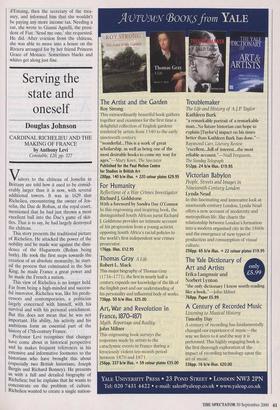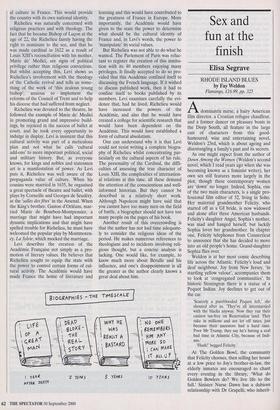Serving the state and oneself
Douglas Johnson
CARDINAL RICHELIEU AND THE MAKING OF FRANCE by Anthony Levi Constable, £20, pp. 327 Visisitors to the château of Josselin in Brittany are told how it used to be consid- erably larger than it is now, with several additional towers. It was in 1629 that Richelieu, encountering the owner of Jos- selin, the Duc de Rohan, at the royal court, mentioned that he had just thrown a most excellent ball into the Due's game of skit- tles. That is to say, he had largely destroyed the château.
This story presents the traditional picture of Richelieu. He attacked the power of the nobility and he made war against the dissi- dence of the Huguenots (Rohan being both). He took the first steps towards the creation of an absolute monarchy; he start- ed the process that culminated in the Sun King; he made France a great power and he made the French a nation.
This view of Richelieu is no longer held. Far from being a high-minded and success- ful innovator, Richelieu was, like his prede- cessors and contemporaries, a politician largely concerned with himself, with his survival and with his personal enrichment. But this does not mean that he was not important. His ability, his activity and his ambitions form an essential part of the history of 17th-century France.
Professor Levi recognises that changes have come about in historical perspective and he makes frequent references in his extensive and informative footnotes to the historians who have brought this about (especially two British historians, Joseph Bergin and Richard Bonney). He presents us with a full and detailed biography of Richelieu; but he explains that he wants to concentrate on the problem of culture. Richelieu wanted to create a single nation- al culture in France. This would provide the country with its own national identity.
Richelieu was naturally concerned with religious practices and with theology. The fact that he became Bishop of Lucon at the age of 22, the Richelieu family having the right to nominate to the see, and that he was made cardinal in 1622 as a result of Louis XIII's reconciliation with his mother, Marie de' Medici, are signs of political privilege rather than religious convictions. But whilst accepting this, Levi shows us Richelieu's involvement with the theology of the Catholic revival and tells us some- thing of the work of 'this zealous young bishop', anxious to implement the reforms of the Council of Trent and to help his diocese that had suffered from neglect.
Richelieu was devoted to the theatre, he followed the example of Marie de' Medici in promoting grand and impressive build- ings, he rejoiced in the success of ballet at court, and he took every opportunity to indulge in display. Levi is insistent that this cultural activity was part of a meticulous plan and not what he calls 'cultural add-ons' to more important political, social and military history. But, as everyone knows, for kings and nobles and statesmen art is a manifestation of power. As Levi puts it, Richelieu was well aware of the propaganda value of culture. When his cousins were married in 1635, he organised a great spectacle of theatre and ballet, with plays by Corneille and Georges de Scuclety, at the 'miles des fetes' in the Arsenal. When the King's brother, Gaston d'Orleans, mar- ried Marie de Bourbon-Montpensier, a marriage that might have had important dynastic implications and that might have spelled trouble for Richelieu, he must have welcomed the popular play by Montmoren- cy, La Sylvie, which mocked the marriage.
Levi describes the creation of the Academie Frangaise not simply as a pro- motion of literary values. He believes that Richelieu sought to equip the state with the power to control certain forms of cul- tural activity. The Academie would have made France the home of literature and learning and this would have contributed to the greatness of France in Europe. More importantly, the Academie would have given to the state the power to determine what should be the cultural identity of France and, in Levi's words, the power to `manipulate' its social values.
But Richelieu was not able to do what he wanted. The Parlement of Paris was reluc- tant to register the creation of this institu- tion with its 40 members enjoying many privileges. It finally accepted to do so pro- vided that this Academie confined itself to discussing the French language. If it wished to discuss published work, then it had to confine itself to books published by its members. Levi examines carefully the evi- dence that, had he lived, Richelieu would have increased the powers of the Academie, and also that he would have created a college for scientific research that would have been dependent on the Academic. This would have established a form of cultural absolutism.
One can understand why it is that Levi could not resist writing a complete biogra- phy of Richelieu whilst concentrating par- ticularly on the cultural aspects of his rule. The personality of the Cardinal, the diffi- culties of assessing the true character of Louis XIII, the complexities of internation- al relations at this time, all these demand the attention of the conscientious and well- informed historian. But they cannot be described in a relatively short work. Although Napoleon might have said that you cannot have too many men on the field of battle, a biographer should not have too many people on the pages of his book.
Another result of this overcrowding is that the author has not had time adequate- ly to consider the religious ideas of the period. He makes numerous references to theologians and to incidents involving reli- gious thought, but a concise analysis is lacking. One would like, for example, to know much more about Berulle and his influence, and one's disappointment is all the greater as the author clearly knows a great deal about him.



























































































 Previous page
Previous page